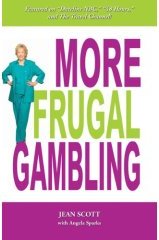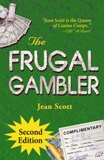
More Frugal Gambling

Frugal Gambler
How to Spot a Fake Casino Review: 5 Red Flags That 'Experts' Don't Want You to See
Let’s be honest. The online casino world can feel a bit like the Wild West.
You just want to find a safe place to play some slots or try a new blackjack strategy. You type "best online There are occasions when we here at ReadyBetGo want to bring you interesting facts about the gambling industry When something catches our eye, we will publish it for your enjoyment.
There are occasions when we here at ReadyBetGo want to bring you interesting facts about the gambling industry When something catches our eye, we will publish it for your enjoyment. 
casino" into Google, and what do you get?
A million pages. All of them screaming "10/10 RATING!" and "EXCLUSIVE #1 BONUS!" and "RATED BEST CASINO 2025!"
Every single site claims to be the #1, top-rated, most-trusted reviewer on the planet. They all have fancy graphics, star ratings, and "reviews" from "players" that all sound suspiciously similar. "I won so much money! The withdrawals were instant!"
It’s exhausting. And if you’ve been around the block, you’ve got that little voice in your head... how many of these are real?
It’s a fair question. The US Federal Trade Commission (FTC) is constantly warning consumers about fake and deceptive online reviews , and the iGaming world is no exception. A lot of "review" sites are just marketing tools owned by the very casinos they're "reviewing."
So how do you, a smart player who just wants the truth, cut through the noise?
You have to learn to "review the reviewer." I've been in this industry for a long time, and I’ve learned to spot the red flags from a mile away. Here’s what I look for.
Red Flag #1: Every Single Review is a 10/10
This is the easiest one to spot. You land on a site, and every single casino on their "Top 10" list has a 9.5, 9.8, or 10/10. Every bonus is "AMAZING." Every game library is "MASSIVE."
Think about anything else you love. Your favorite restaurant? It probably has one waiter who’s a bit slow. Your favorite movie? It probably has a plot hole. Nothing is perfect.
A real review—a helpful review—is critical. It should tell you what’s wrong with the casino, not just what’s right. I want to see things like:
- "The game selection is great, but their credit card withdrawal fees are too high."
- "The bonus is huge, but the wagering requirement is 50x, which is frankly ridiculous."
- "They have 24/7 chat support, but I had to wait 20 minutes for an answer."
If a review site has no "Cons" section, or if the "Cons" are weak, like "So many games it's hard to choose!"... close the tab. They’re not reviewing; they’re selling.
Red Flag #2: They Don't Talk About "Who"
Who owns the casino? Who gave them their license?
This is so, so important. A casino is a financial institution. You’re giving them your money. Would you put your paycheck in a bank if you couldn't find out who owned it or what country it was licensed in? Of course not.
A lazy or fake review just says "It’s safe and secure!"
A real review will have a "Security" or "License" section that names names. They'll say, "This casino is owned by Baytree Interactive Ltd," or "It's licensed by the Malta Gaming Authority (MGA) under license number MGA/B2C/123/2004."
This information is critical. It tells you who to hold accountable if something goes wrong. If a reviewer doesn't bother to find this (it’s usually in the website's footer), they haven’t done their homework.
Red Flag #3: They Don't Explain How They Review
What’s their system? Does it just feel like a "9.5/10" to the writer? Or is there a process?
You’re here on ReadyBetGo because you like strategy. You should expect the same from your reviewers.
The best, most trustworthy reviewers have a public, transparent process. For example, some sites (like Casino.org) follow a public "25-step review process" that looks at everything from license checks to game testing and withdrawal speeds.
I don’t care if it’s 25 steps or 5. I just want to know that they have a system. A good Casinoguru or review platform will have a page that literally says "This is Our Review Process." It shows they’re taking it seriously and, more importantly, it means they are consistent. It means their 8/10 for Casino A means the same thing as their 8/10 for Casino B.
Red Flag #4: They Don't Talk About Fairness or Testing
This one is a bit more technical, but it separates the pros from the amateurs.
How do you know the games aren't rigged?
A fake reviewer will just say, "The games are 100% fair!" Okay, says who?
A real reviewer will look for proof. They’ll look for a logo or a certificate from a third-party, independent testing agency. These are companies that specialize in auditing casino game math to make sure the "Return to Player" (RTP) is what the casino claims it is.
The big names you want to see are eCOGRA or iTech Labs.
If a casino has a seal from one of these agencies, it means they have voluntarily opened their books to an independent auditor to prove their games are fair. That’s a massive green flag. If a reviewer doesn’t even mention this, they don't know what they're talking about.
Red Flag #5: They Don't Promote Responsible Gambling
This is the ultimate litmus test for me.
Think about it. The only goal of a fake, scammy review site is to get you to deposit money. That’s it. They don't care what happens after that.
A responsible, legitimate resource wants you to be a safe, long-term, educated player. They know that players who go broke in one night don't come back.
A good review site will have a dedicated, visible section on Responsible Gambling. They will have links to resources for help. They will talk about the casino's own responsible gambling tools, like:
- Deposit Limits
- Self-Exclusion Options
- Session Time Reminders
If a "reviewer" isn't actively telling you how to stay safe, they do not care about you. They only care about their commission.
So next time you’re hunting for a new site, don't just look at the star ratings. Be a critic. Be skeptical. Review the reviewer. It’s the only way to find a place that actually deserves your time and your money.

